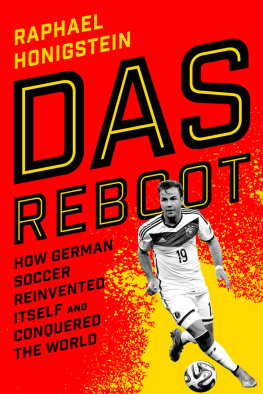DAS REBOOT
Also by Raphael Honigstein
Englischer Fussball:
A German View of Our Beautiful Game

Copyright 2015 by Raphael Honigstein.
Published in Great Britain by Yellow Jersey Press, an imprint of Vintage, part of the Penguin Random House group.
Published in the United States by Nation Books, A Member of the Perseus Books Group
116 East 16th Street, 8th Floor
New York, NY 10003
Nation Books is a co-publishing venture of the Nation Institute and the Perseus Books Group
All rights reserved. Printed in the United States of America. No part of this book may be reproduced in any manner whatsoever without written permission except in the case of brief quotations embodied in critical articles and reviews. For information, address the Perseus Books Group, 250 West 57th Street, 15th Floor, New York, NY 10107.
Books published by Nation Books are available at special discounts for bulk purchases in the Unitbed States by corporations, institutions, and other organizations. For more information, please contact the Special Markets Department at the Perseus Books Group, 2300 Chestnut Street, Suite 200, Philadelphia, PA 19103, or call (800) 810-4145, ext. 5000, or e-mail .
Typeset in India by Thomson Digital Pvt Ltd, Noida, Delhi
A CIP catalog record for this book is available from the Library of Congress.
LCCN: 2015947738
ISBN: 978-1-56858-531-4 (e-book)
First US Edition
10 9 8 7 6 5 4 3 2 1
To Opa Leo who loved football, and to Opa Heinrich who didnt.
CONTENTS
Guide
This is a story about control
Janet Jackson
The crushing bleakness of the day was sliced through by a metallic roar. Two Mercedes sports cars, driven by Formula 1 ace Nico Rosberg and Pascal Wehrlein, the teenage Deutsche Tourenwagen Masters driver, chased each other down an alpine pass. Rosberg braked sharply at a clearing ahead of a tight rightleft turn, then accelerated on the straight descent towards the centre of the village of St Martin, in South Tyrol. As he passed an open wooden barn on his right, he slowed abruptly. Behind him Wehrlein squeezed his car to the left to avoid a crash and shot up the driveway of a guest house on the same side. There was no time to brake for the steward and the German spectator.
Benedikt Hwedes, Wehrleins passenger, jumped out to administer first aid to the victims of the horrific accident. The steward, who later explained that he had tried to drag back the middle-aged holidaymaker from the closed-off rally course, suffered moderate injuries and was driven to a local hospital. The second mans life-threatening head injuries meant that he had to be airlifted to receive more specialist treatment in Bolzano. I think these images will stay with me for a while, said Hwedes. The Schalke 04 defender and his club-mate Julian Draxler, who was sitting next to Rosberg, were unhurt, but needed the help of the national team psychologist Hans-Dieter Hermann in the aftermath.
The disastrous PR stunt with Mercedes-Benz, the German national teams main sponsor, midway through the training camp in northern Italy, marked the nadir of a pre-2014 World Cup preparation that couldnt have gone worse. A couple of days earlier, news of a most unfortunate off-target attempt by Kevin Grokreutz had broken. The Borussia Dortmund midfielder had urinated drunkenly in the middle of a Berlin hotel lobby and clashed with an employee and guest in the wake of his sides 2-0 defeat against Bayern Munich in the DFB Cup final. Grokreutzs lapse threatened the clean, positive image of the German team that general manager Oliver Bierhoff and coach Joachim Lw had worked very hard to cultivate. Oliver Bierhoff and I have had a serious talk with Kevin, said Lw. International players are role models off the pitch as well as on it.
Lw, however, it was soon revealed, had himself fallen rather short of such exalted standards. The Bundestrainer had to confess to having lost his driving licence after being caught speeding and using his mobile phone while driving. Ive learned my lesson and will change my behaviour on the road, said Lw. Bierhoff, appearing at a press conference ahead of the Mercedes event, tried to downplay Lws offence with humour: These things happen, well make sure hell only get cars with a speed limiter in future. The light-hearted tone appeared particularly ill conceived when Wehrleins car slammed into the two bystanders later that afternoon. The Frankfurter Allgemeine Zeitung (FAZ) deplored the German team for straying from reality in their isolated Alpine set-up and for losing its self-control.
The near-fatal accident outside the Holzerhof guest house was only the latest and most dramatic example of corners being cut two weeks before the start of the tournament. Lw had made it a central tenet of his 2014 World Cup plan over the preceding two years that only players in peak physical condition would be selected for Brazil, where the national manager expected to grapple with supernatural forces. But the no compromise line was quietly shelved as key players Manuel Neuer, Philipp Lahm, Bastian Schweinsteiger (all Bayern Munich) and Sami Khedira (Real Madrid) turned up in northern Italy in varying states of unfitness. Doubts over the physical shape of veteran striker Miroslav Klose after a season with little football at Lazio added to the pervading sense of uncertainty. Instead of being able to rely on his teams spine, Lw was staring at a team sheet full of question marks.
Neuer, the outstanding goalkeeper, had hurt his shoulder in the DFB Cup final and missed the first days of the training camp, along with the consistently excellent and versatile Lahm, who was nursing a complicated ankle injury. There were days when I couldnt run in straight lines, recalls the captain, sitting in his agents office in Munichs fashionable meatpacking district. The team were already in Italy, yet I was still with the doctors in Munich. They were saying that they couldnt really tell me anything because the scans looked so strange. Everything was swollen.
Khedira, the box-to-box dynamo, had looked woefully short of match sharpness in the Champions League final against Atltico Madrid after spending six months on the sidelines following cruciate ligament surgery. His central midfield partner, Schweinsteiger, the emotional leader, as Lw called him, had a long-standing problem with tendonitis.
Lw kept insisting that all his chief lieutenants would be back on their feet in time for the Portugal match on 16 June, but many reporters found his optimism deeply unsettling. They recalled how Lw had refused to bench a patently out of sorts Schweinsteiger in the Euro 2012 semi-final defeat against Italy in Warsaw. The Bundestrainers loyalty had been admirable in principle but an awful miscalculation in practice. The midfielders problems in the quarter-final win against Greece in Gdansk had been apparent to everyone. Half of the questions posed to his team-mates in the mixed zone that night had inquired after the fragile state of Schweinsteigers ankle. But Lw had wanted to believe that everything would turn out okay. It didnt. His blind faith in one of his big names was seen as one of the main reasons why Germany had failed to advance to the final of a competition they had been expected to win.
Lws reputation had taken a severe beating in Poland. BBC pundit and former player Martin Keown told British viewers that Germanys collapse was down to arrogance, but, if anything, Lw hadnt been nearly arrogant enough with his selection and tactics. He had specifically adapted his formation to counter the threat of playmaker Andrea Pirlo, the bearded maestro who had driven England to distraction with his passing skills in the Kiev quarter-final.
Next page










